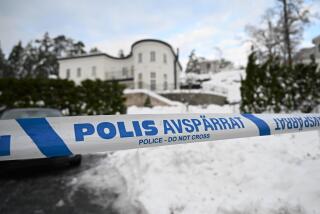Sweden Says It Can’t Act on Suspected Nazis
- Share via
STOCKHOLM — A dozen suspected Nazi war criminals said to be living in Sweden cannot be prosecuted or deported even if they are located, according to a Justice Ministry spokesman, but Prime Minister Ingvar Carlsson said Wednesday that his government will look into the allegations.
Ministry spokesman Johan Munck said that even the most severe crimes that can be prosecuted in Sweden or lead to deportation have a 25-year statute of limitations.
“Under existing Swedish law, they can not be prosecuted and they cannot be deported to any other state,” Munck said. “The only thing that could happen is that they could lodge a civil lawsuit for slander if their names were published in a newspaper.”
But Carlsson said the government will “definitely look into it.”
Asked if the limitation statute could be changed, Carlsson said, “I am not a lawyer. I do not want to make judicial comments.”
The Los Angeles-based Simon Wiesenthal Center for Holocaust Studies presented a list of 12 names to the Swedish Embassy in Washington on Tuesday. It said most of those named were from Latvia, Lithuania and Estonia and are now living in Sweden under their original names.
Rabbis Marvin Hier and Abraham Cooper of the center said the names were gleaned from a 12-million-name data bank on post-World War II migration. They refused to disclose the names or how the center came in possession of them.
Hier said the list was based on information obtained in the last 10 weeks by the center, which has since given 40 other names of suspected war criminals to Australia, 26 to Canada, 17 to Britain, three to Venezuela and one to Brazil.
The Associated Press said news reports here said the Wiesenthal Center documents quoted mainly Soviet publications in naming the 12.
“The evidence upon which the accusations are based is extremely questionable,” said Gunnar Rode of the Stockholm-based Central Latvian Council. “I think that the Soviet KGB had a hand in the authorship of the documents.”
More to Read
Sign up for Essential California
The most important California stories and recommendations in your inbox every morning.
You may occasionally receive promotional content from the Los Angeles Times.










